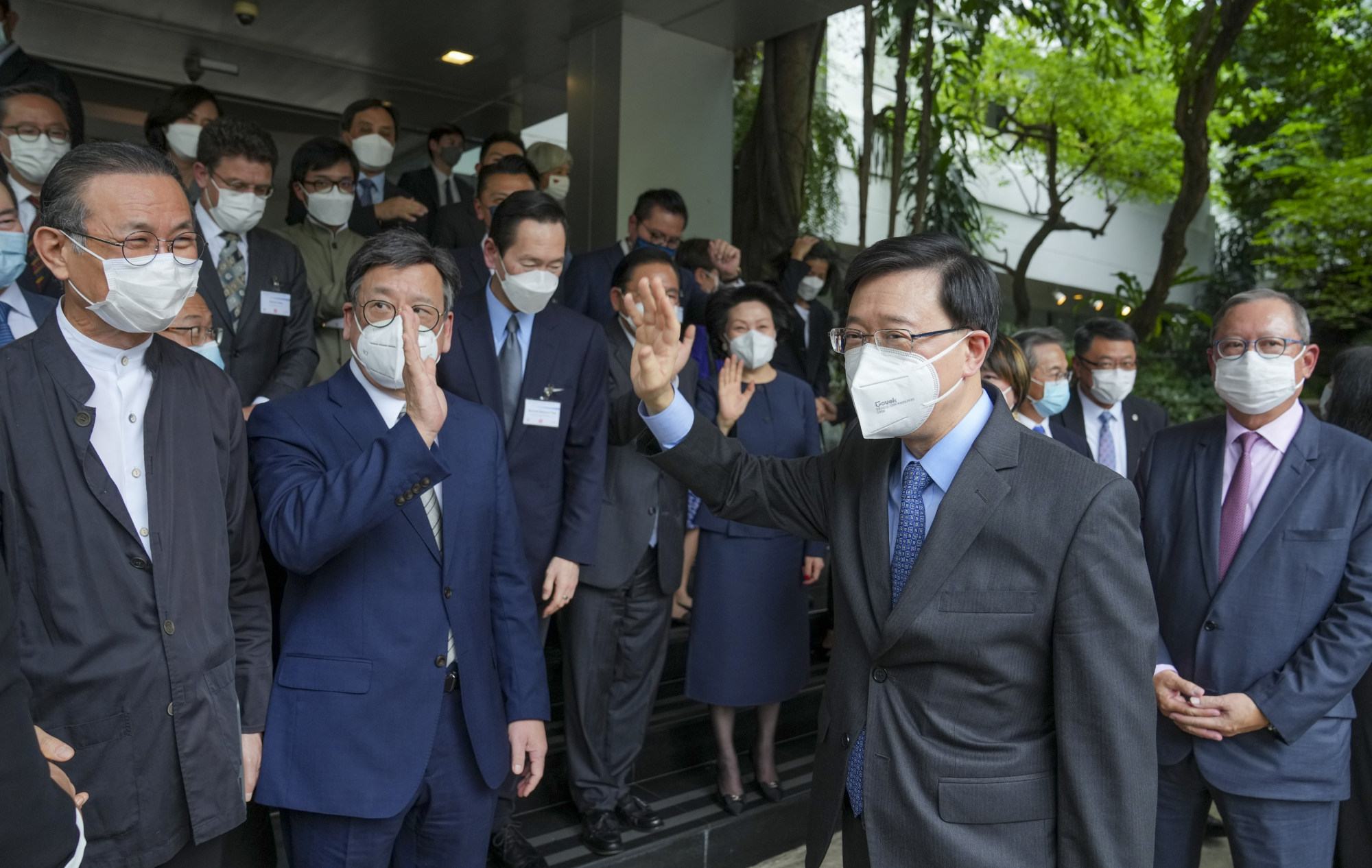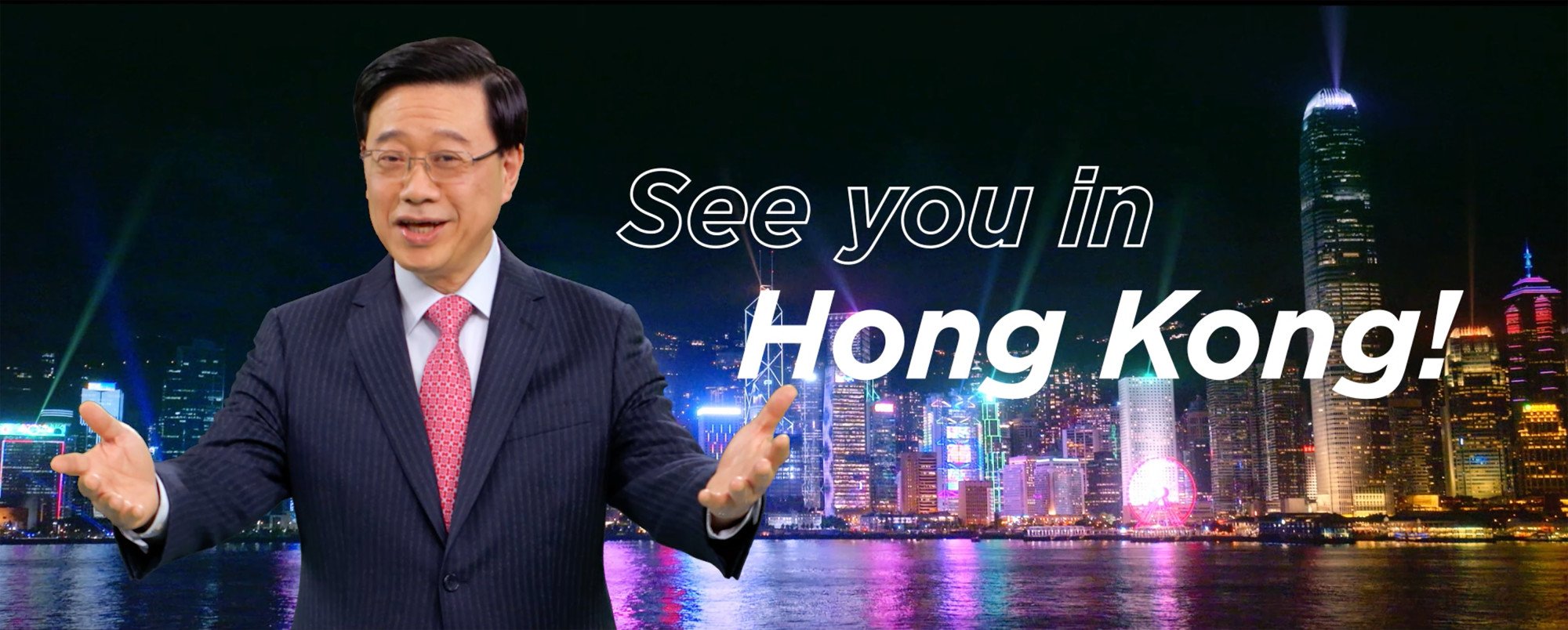Hong Kong leader John Lee Ka-chiu or his ministers have gone on 13 overseas visits in the seven months since he took office, mainly to countries in Southeast Asia and the Middle East.
Observers have said the promotion efforts are reasonable amid ongoing tensions between China and the West, but add that the city still has to maintain relations with its existing markets.
A count by the Post found that Lee and his ministers made 13 trips between July 1, 2022, and January 31 this year – eight to Southeast Asia, two to the Middle East, two to mainland China and one to Switzerland.
Do you have questions about the biggest topics and trends from around the world? Get the answers with SCMP Knowledge, our new platform of curated content with explainers, FAQs, analyses and infographics brought to you by our award-winning team.

A delegation of several officials to the same destination was counted as one trip, while one official visiting more than one country on the same trip was counted as more than one visit.
The Southeast Asian trips took Hong Kong officials to Cambodia, Indonesia, Vietnam, Singapore and the Philippines, while the Middle East visits were to Bahrain and Saudi Arabia.
On Saturday, Lee left for an eight-day trip to the Middle East with a high-level delegation that will visit Saudi Arabia and the United Arab Emirates.
This is his second overseas trip since becoming chief executive. He attended the Asia-Pacific Economic Cooperation (Apec) summit in Thailand last November.
Hong Kong leader to meet ‘senior Saudi officials, bosses of oil giant Aramco’ on trip
International relations expert Wilson Chan Wai-shun, from Chinese University, said the government’s focus on Southeast Asia and the Middle East was in line with Beijing’s priorities.
The top leaders’ efforts represented a form of division of labour, he added, with the government expanding to new markets while the private sector maintained relations with Western countries wary of an official outreach.
“In the transition period of the international order, it is impossible for Hong Kong, as an international city, not to change its approach to the rest of the world,” Chan said.
Soon after taking office, Lee pledged to resume official foreign visits and step up efforts to promote the city.
With the Covid-19 pandemic receding, he unveiled the “Hello Hong Kong” campaign on Thursday, with free air tickets, spending vouchers and special events to bring visitors back.

Despite the new push, the number of official trips remained a far cry from those before the pandemic.
The Post recorded 86 official trips to the mainland and overseas during the first seven months of previous leader Carrie Lam Cheng Yuet-ngor’s administration in 2017.
Most were to destinations on the mainland, with 32 to various places across Asia, Europe, Africa, Oceania, North and South America.
The pandemic saw Hong Kong isolate itself with some of the world’s most stringent entry restrictions, while political changes in the wake of the 2019 anti-government protests led to new tensions with the West.
Hong Kong leader dismisses calls for independent review of pandemic handling
Lee was among several senior officials in the previous administration who were sanctioned by the United States in August 2020 for “undermining Hong Kong’s autonomy” after Beijing imposed the national security law in June that year.
Those sanctioned included the current No 2 official, Chief Secretary Eric Chan Kwok-ki and Secretary for Security Chris Tang Ping-keung.
The sanctions meant their US-based assets were blocked and Americans and businesses were generally forbidden from dealing with them. They and their family members were also barred entry to the US.
Aside from concerns expressed by Western countries about the situation in Hong Kong, the United Kingdom, Canada and Australia sparked a wave of emigration over the past two years by opening new migration schemes for Hongkongers wishing to leave.
About 10 per cent of Hong Kong’s kindergartens at risk of closing: teacher group
Whether the Hong Kong leadership’s new focus on Southeast Asia and the Middle East would be enough depended on how it viewed the city’s place in the world, Chinese University’s Chan said.
That focus might suffice if Hong Kong identified itself as a place that served countries that were part of Eurasia – Northeast Asia, Central and Eastern Europe and the Central Asian republics – or China’s Belt and Road Initiative, he said, but perhaps not if it was positioned differently.
Gary Ng Cheuk-yan, a senior economist with Natixis Corporate and Investment Bank, said the visits reflected an “active effort” by Lee and his team to diversify potential sources of growth for the city.
But he added that expanding into Southeast Asia or the Middle East would not offset economic gains to be had from existing markets such as the US, Europe, Japan and Taiwan.
“A pure dive into emerging markets will not save Hong Kong from the US-China strategic competition and decoupling trends, as these countries will also be affected indirectly,” he added.
Hong Kong to attract Middle East companies with promotion drive: finance chief
Lawmaker Holden Chow Ho-ding, vice-chairman of the Democratic Alliance for the Betterment and Progress of Hong Kong, also agreed saying there was no question of the city abandoning its traditional markets in Europe and the US now that it was developing those in Asean and the Middle East.
However, Steve Tsang, director of the China Institute at the University of London’s School of Oriental and African Studies, said Lee’s government was “misguided” if it believed its plans would attract businesses and visitors to the city.
“Hong Kong itself was a very strong brand in attracting tourist and business visitors before the pandemic and, in particular, before 2019,” said Tsang, referring to the months of social unrest that year.
He said it was the “misguided policies” of the previous and current administrations, resulting in the repression of individual rights and travel restrictions during the pandemic, that had put people off visiting Hong Kong.
“To restore Hong Kong’s attractiveness to visitors, allow it to be what it was. This is regrettably something the Lee Administration is not ready to do,” he said.
More from South China Morning Post:
- John Lee signals ‘satisfaction’ with results as first overseas trip as Hong Kong’s leader ends
- Hong Kong leader John Lee to meet ‘senior Saudi officials, top executives of oil giant Aramco’ during trip to Middle East
For the latest news from the South China Morning Post download our mobile app. Copyright 2023.





